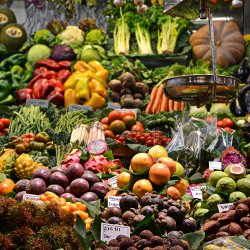
Exam season is a stressful time. The library is packed, anxiety is in the air and any sense of routine is out of the window.
It is easy to skimp on sleep, avoid fresh air, skip the weekly sabbath and throw any health promoting habits out of the window. And though it may seem like a good idea to neglect exercise and good nutrition to save time and get work done, it can actually be counterproductive. Our holistic health is important and the bible teaches that our bodies are a temple, a reminder for us to take our health and well-being seriously. It is easy for this to take a backseat during exams but getting plenty of sleep, regular movement, and healthy eating increases energy and stamina, improves mood and well-being and improves sleep quality and focus. All these are essential to thriving through the busyness of life.
Navigating how to eat well and cook nutritious meals on a budget can be tricky generally at uni so here are four helpful reminders to stay nourished during exam season.
Don’t skip meals
It is tempting to skip meals as routine is lost and the cost of ordering your fifth Domino's pizza in a row has depleted the remainder of your student loan. But It is important to get balanced meals at breakfast, lunch and dinner that include the following macronutrients: complex carbohydrates, protein and healthy fats which will ensure that your body and brain is getting the fuel it needs throughout the day. It is also easy to opt for snacks that are high in sugar for an energy boost throughout the day but excessive consumption can lead to high blood glucose spikes and drops which cause tiredness. Healthy snacks that pair either two or more macronutrients together are filling and release energy slowly. Ideas include crunchy carrots with hummus, a freshly cut apple with peanut butter, or greek yoghurt with berries. These snacks are also a great way of getting more fibre into the diet which is important for gut health.
Check out The Eatwell Guide for more information on how to achieve a healthy, balanced diet.
If you have the fridge and freezer space, batch cooking is a great way to prepare nutritious meals in advance. You can prepare curries, stews, soups and pasta sauces to take with you or whip out when you’re tired. It’s cost effective and means you can have yummy meals on the go for those long days at the library.
NOURISH your second brain
Did you know you have a second brain? It’s called the gut microbiome - trillions of microbes found in your intestines that function as an organ. Every individual has a unique microbiome impacted by various factors such as nutrition, exercise, emotional well-being, use of antibiotics, how you were born and what you were fed as a baby.
The gut-brain axis is the constant communication that happens between the gut and the brain (think nervous poo...), and the research around it is fascinating. One of the ground-breaking research about the gut is how it affects mental health, and as this is something that many struggle with due to the stress of deadlines and exams, looking after our guts is key and food is an important part of that.
Increasing your consumption and variety of plant foods is key to improving gut health as it feeds the good bacteria and helps them proliferate. Examples of plant foods include fruits, vegetables, nuts, seeds, beans, pulses and grains. These foods are high in fibre and contain important nutrients beneficial to health.
For a more cost-effective way to include more plants in your diet:
- Don’t overcomplicate it. What do you eat already and where can you add an extra portion of fruit and vegetables? It could be topping up your regular porridge with a portion of berries or adding some cauliflower to your standard chicken curry.
- Frozen or tinned fruits and vegetables are great! They are nutritious and often cheaper than the fresh alternatives.
- Swapping refined carbohydrates for complex carbohydrates often makes no difference in price. Simply opting for brown rice instead of white rice is a great way to increase nutrients and provide a slower release of energy throughout the day.
Stay hydrated
Did you know that nearly 75% of your brain is water? And that even mild dehydration can impact your mood, productivity and concentration?
Getting a reusable water bottle is a great way to track your water intake throughout the day and it is recommended that most people should drink 1.5-2 litres of water everyday, or more with sunny weather or exercise.
Signs that you are dehydrated include dark wee, using the loo less than 4 times a day, dry mouth, feeling more fatigued than normal and struggling with low moods.
Quench that thirst and stay hydrated throughout the day for a more focused study session.
Notice your relationship with food
Not only is what we eat important but our relationship with food is too. For several reasons eating can be complicated and stressful for many people and not everyone has a positive relationship with food. You may be struggling with disordered eating or an eating disorder, or you have in the past and are noticing old behaviours creeping in. This, along with the pressures of deadlines, can make eating well during exam season even tricker.
If this is you, please reach out to professional support such as a GP, your university counselling service, or a registered specialist dietitian.
Beat and Mind are excellent mental health and eating disorder charity helplines that can help you get the support you need.
These are a few simple nutrition reminders for your time at university, however there is no one size fits all in nutrition as every individual is unique. Your gender, genetics, health status, level of physical activity, metabolism and preferred food choices make your nutritional needs specific. Chat to the dietetic and nutrition students on campus or find yourself a registered nutritionist to discover more!






